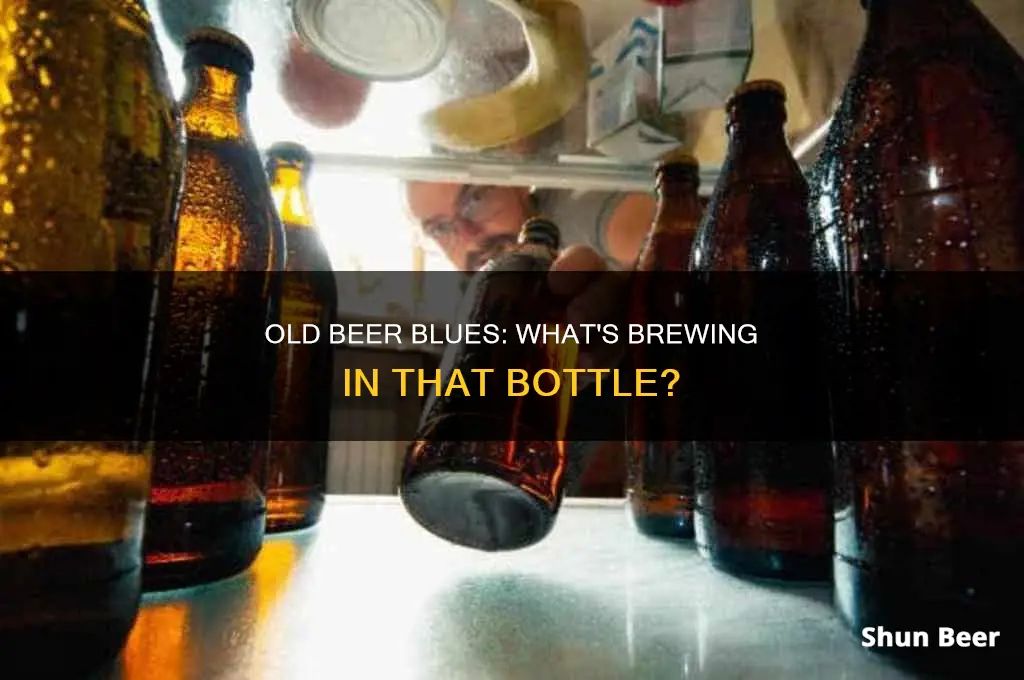
Drinking old beer is unlikely to make you sick, but it might taste unpleasant. The fermentation process used in brewing, as well as the low pH level and alcohol content of beer, make it difficult for harmful microorganisms to survive. However, the taste of beer changes over time, and old beer may lose its carbonation, develop a vinegary taste, or take on a skunky flavour if exposed to sunlight. To keep beer fresh, it's best to store it in a cool, dark place and consume it within a few months of purchase.
| Characteristics | Values |
|---|---|
| Will old beer hurt you? | No, if it was properly sealed, but it might not taste as good. |
| Will old beer make you sick? | No, the alcohol content in beer and the presence of hops (which have antimicrobial characteristics) prevent pathogenic growth. |
| What does old beer taste like? | Sour, oxidized and like wet cardboard, or skunk. |
| How to prevent bad beer? | Keep beer in a cool, dark place, preferably the refrigerator. |
What You'll Learn

It's unlikely to make you sick
Drinking old beer is unlikely to make you sick. The fermentation process used in brewing, along with its low pH level and alcohol content, makes beer an unfriendly environment for microorganisms. Even if a beer sits on the shelf for years, as long as it's sealed, it's unlikely to cause any health issues.
The worst thing that can happen when drinking old beer is that it might not taste very good. The delicate characteristics of hops, which give beer its wonderful aroma, can dissipate over time, resulting in a less pleasant drinking experience. However, even with reduced flavour, old beer is still safe to consume.
It's important to note that different beers have different shelf lives. High-alcohol, malt-forward styles like barley wines and imperial stouts are sometimes brewed with aging in mind. These beers can be safely consumed even after a couple of years, as their flavours develop and become richer.
To maintain the freshness of your beer, it's recommended to store it in a cool, dark place, preferably a refrigerator. Exposure to light and temperature fluctuations can negatively impact the flavour, but they don't affect the safety of the beer.
In summary, while drinking old beer might not provide the same enjoyable taste as fresh beer, it's unlikely to make you sick. The alcohol and hops in beer act as preservatives, preventing pathogenic growth and ensuring it remains safe for consumption, even if the flavour profile changes over time.
Cold Weather, Warm Beer: Should You Drink It?
You may want to see also

It might taste bad
It's unlikely that drinking old beer will make you sick, but it might taste bad. The fermentation process, low pH level, and alcohol content of beer make it an unfriendly environment for microorganisms. However, the taste of beer changes over time, and it can become unpleasant. Old beer may taste overly sweet, sour, or like wet cardboard or vinegar. It can also become flat, which indicates that the seal was broken at some point, compromising the taste.
The delicate hop characteristics of beer can dissipate over time, resulting in a loss of the wonderful hoppy aroma found in fresh IPAs. Additionally, exposure to oxygen can cause oxidation, leading to a disappointing papery or stale taste. Heat can accelerate oxidation, so it's best to store beer in a cool, dark place like a refrigerator. Major temperature changes and exposure to sunlight can also negatively impact the taste of beer.
While old beer may not be harmful to your health, it's important to check for signs of spoilage before consuming it. If the beer has lost its fizz, has a vinegary taste, or smells unpleasant, it's best to discard it.
Drinking Beer Outside: Legal or Not?
You may want to see also

It could be safe to drink
Drinking old beer is unlikely to be harmful to your health, but it might not taste very nice. The fermentation process used in brewing, along with the low pH level and alcohol content, means that beer is an unfriendly environment for microorganisms that could cause sickness. Even if a beer has been sitting on the shelf for years, as long as it's sealed, it's unlikely to make you ill.
However, the taste of beer can change over time, and it may become unpleasant. This is especially true for hop-heavy styles like IPAs, as the volatile aromas from hops are one of the first things to break down as beer ages. If you do decide to drink old beer, it's important to check that the seal is still intact and that the beer is not past its recommended shelf life, as the flavour may have deteriorated.
Some beers are better at outlasting the test of time than others. High-gravity beers, such as barley wines or imperial stouts, can benefit from ageing, acquiring richer flavours as they slowly oxidise. On the other hand, low-gravity beers can start to taste stale much more quickly, and may only last for around six months if kept refrigerated.
If you're planning on ageing your beer, it's important to store it in a cool, dark place, preferably a refrigerator. Exposure to light and heat can cause off flavours to develop, and major temperature changes can also have a negative impact on the taste.
Steak and Beer: The Perfect Pairing Guide
You may want to see also

It might be flat
If you've left a beer sitting around for a while, it might be flat when you come to drink it. This is a sign that the seal has been broken at some point, and the beer will not taste as it should.
The carbonation in beer comes from carbon dioxide, which is produced during the fermentation process. When yeast breaks down sugars in the beer, it produces alcohol and carbon dioxide as by-products. This carbon dioxide is what gives beer its fizz. However, if the seal is broken, the carbon dioxide can escape, and the beer will go flat.
In addition to a loss of carbonation, a flat beer may also have a different flavour. This is because, when the seal is broken, oxygen can enter the beer. Oxygen interacts with the compounds from malt, yeast, and hops, causing oxidation and a disappointing papery or cardboard-like taste.
To prevent flat beer, it's important to store it properly. Beer should be kept in a cool, dark place, preferably a refrigerator. If stored at room temperature, it should be kept out of direct sunlight. Additionally, beer should be stored upright, as this minimises the surface area exposed to oxygen.
While drinking a flat beer is unlikely to be harmful to your health, it's probably not going to taste very good. So, if you're looking for a refreshing beer experience, it's best to make sure your beer is fresh and properly stored.
Beer and Gout: What's the Connection?
You may want to see also

It could have a vinegary taste
If you notice a vinegary taste in your beer, it's a sure sign that bacteria have gotten into the brew, and it's time to pour it down the drain. While drinking old beer is unlikely to make you sick, the taste of beer changes over time, and it may become a "real stinker".
The fermentation process, low pH level, and alcohol content of beer make it an unfriendly environment for microorganisms. Even if a beer sits on the shelf for years, as long as it's sealed, it's unlikely to make you ill. However, the taste will change, and what was once refreshing could become unpleasant.
The volatile aromas from hops are among the first things to break down as beer ages. This is particularly noticeable in IPAs, where the wonderful hoppy aroma is one of the defining features. As the beer gets older, the hoppy notes will dissipate, and the beer may take on a vinegary taste.
While old beer is unlikely to be harmful, it's important to note that some styles of beer are more susceptible to taste changes than others. Low-gravity, pale, low-alcohol beers will taste stale much more quickly. These beers are best consumed within a few months of purchase. On the other hand, high-gravity beers like barley wines and imperial stouts are sometimes brewed with aging in mind and can develop richer flavours over time.
To summarise, while drinking old beer is usually safe, it may not be a pleasant experience. If your beer has developed a vinegary taste, it's best to discard it and open a fresh one.
Beer and Vitamins: Can They Mix?
You may want to see also
Frequently asked questions
Drinking old beer will not make you sick, but it might not taste very good. The worst thing that will happen is that the beer will taste bad.
Old beer can taste like wet cardboard, or be tangy or acidic. It can also lose its fizz.
Beer is best consumed as fresh as possible, especially hop-heavy styles like IPAs. Beer can last for years if stored correctly, in a cool, dark place, but its flavour will change over time.
Check the expiration date on the packaging, if there is one. If the beer has lost its fizz, or tastes vinegary, it has gone bad and should be thrown out.







